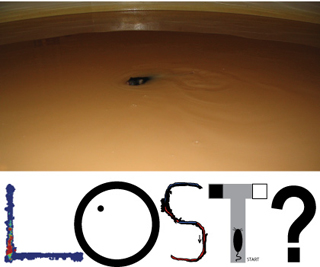
The Morris water maze is used to explore the role of the hippocampus in the formation of spatial memories. (Photo by Ariel Kamsler)
Instructor(s)
Dr. Ariel Kamsler
MIT Course Number
7.346
As Taught In
Fall 2007
Level
Undergraduate
Course Description
Course Features
Course Description
In this course we will discover how innovative technologies combined with profound hypotheses have given rise to our current understanding of neuroscience. We will study both new and classical primary research papers with a focus on the plasticity between synapses in a brain structure called the hippocampus, which is believed to underlie the ability to create and retrieve certain classes of memories. We will discuss the basic electrical properties of neurons and how they fire. We will see how firing properties can change with experience, and we will study the biochemical basis of these changes. We will learn how molecular biology can be used to specifically change the biochemical properties of brain circuits, and we will see how these circuits form a representation of space giving rise to complex behaviors in living animals. A special emphasis will be given to understanding why specific experiments were done and how to design experiments that will answer the questions you have about the brain.
This course is one of many Advanced Undergraduate Seminars offered by the Biology Department at MIT. These seminars are tailored for students with an interest in using primary research literature to discuss and learn about current biological research in a highly interactive setting. Many instructors of the Advanced Undergraduate Seminars are postdoctoral scientists with a strong interest in teaching.


